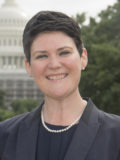
 By Executive Director Amanda Tyler
By Executive Director Amanda Tyler
In a recent White House ceremony, President Donald J. Trump spoke in grandiose terms about religious liberty, harkening back to our founding era and mentioning Thomas Jefferson by name. As he read “religious liberty” in the title of the Executive Order he was about to sign, surrounded by supporters from a few religious groups, the president remarked on our first freedom in his off-the-cuff manner, “That’s as big as it gets.”
On that, we agree. But the rest of the May 4 spectacle gave me a lot to take issue with. Specifically, much of the rhetoric of the day simply didn’t match reality.
The president declared, “Today my administration is leading by example as we take historic steps to protect religious liberty in the United States of America.” But as groups and commentators from across the ideological spectrum looked closely at the Order, most characterized this executive action as far from historic. In our view, it was “largely a symbolic act, voicing concern for religious liberty but offering nothing to advance it.” The conservative National Review columnist David French referred to it as “worse than useless” and a “nothing-burger.” The ACLU said it had “no discernible policy outcome” and was “a textbook case of ‘fake news.’”
Part of the Order relates to IRS enforcement of the “Johnson Amendment,” the portion of the tax code that prohibits all 501(c)(3) organizations, including most houses of worship, from intervening in partisan candidate campaigns. It directs the Secretary of the Treasury not to take adverse action against houses of worship and others speaking from a religious perspective “to the extent permitted by law” and “where speech of similar character has, consistent with law, not ordinarily been treated as participation or intervention in a political campaign.”
On its face, this action does not appear to be a meaningful change from current IRS practice, and it is a far cry from President Trump’s vow at February’s National Prayer Breakfast to “totally destroy the Johnson Amendment.” But it does signal Trump’s continued fixation on this tax code provision, which he first centered on in the campaign when some of his faith advisers cited it after he asked why they were not endorsing him.
The president, some members of Congress, and the interest groups supporting their bid to change the tax law continue to blur the lines between being generally “political” – which is permitted – and taking a partisan position for or against a candidate’s campaign for office – which is not. The president stated in the Rose Garden that “if a pastor, priest, or imam speaks about issues of public or political importance, they are threatened with the loss of their tax-exempt status.” Not so. The church has always been political, and nothing in the tax code prevents it, as the church, from speaking to issues, no matter how controversial. Additionally, faith leaders can endorse and oppose candidates in their personal capacity without running afoul of the tax law.
The president also boasted at the signing ceremony, “We’re giving our churches their voices back and we are giving them back in the highest form.” I didn’t know the church had lost its voice. What I have heard when talking with religious leaders is concern that changing the law to encourage partisan campaign involvement by churches would endanger their prophetic voice by tying them too closely to government or a particular officeholder or party. It would also distract them from the work of the church by bringing partisan divisions into their church family. One pastor worried about what this change would do to his congregation, which he called “beautifully diverse.” That concern has been echoed in many similar conversations. Plus, public polling shows us that all religious groups share this same aversion to candidate endorsements in and by the church.
The BJC realized that the faith community’s position was being misrepresented and joined with 98 other religious and denominational organizations to tell Congress that we don’t want and we don’t need a change in the tax law for the church to pursue its mission. We delivered that letter to Congress in April and saw it cited numerous times in press reports on the president’s latest executive action.
Now, the BJC has helped organize an effort for individuals to add their name and their words to this effort. Who better than those who minister, either as ordained clergy or laity, to talk about the impact that a change in the law would have on their congregations? I have added my name to this letter, and I hope you will consider doing the same. We need to counter the rhetoric and do our part in this instance to keep “religious liberty” from being used as a misleading sound bite.
From the May/June 2017 edition of Report from the Capital. You can also read the digital version of the magazine or view it as a PDF.




